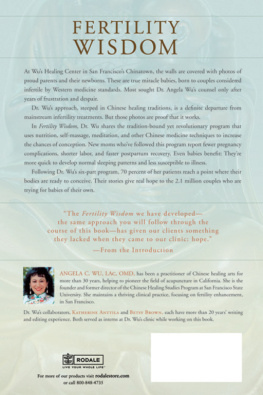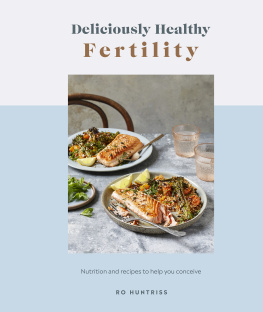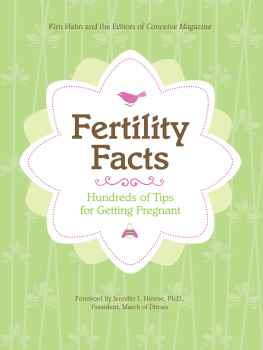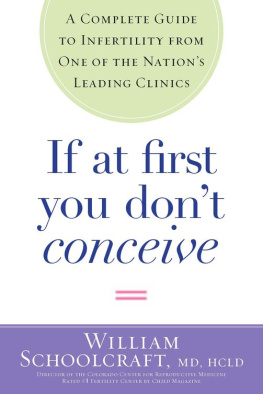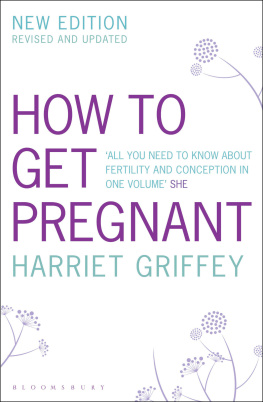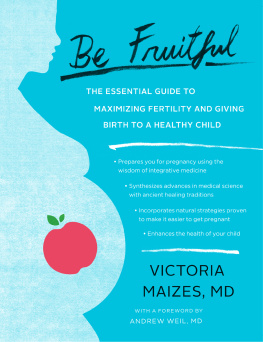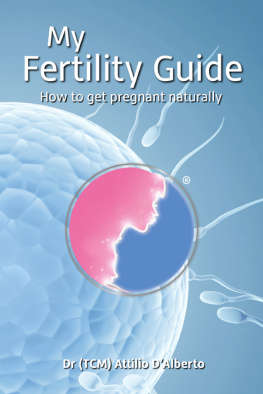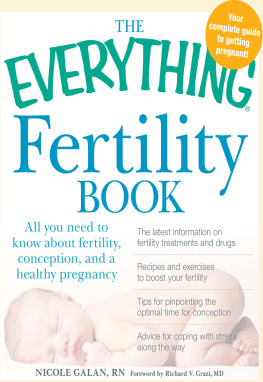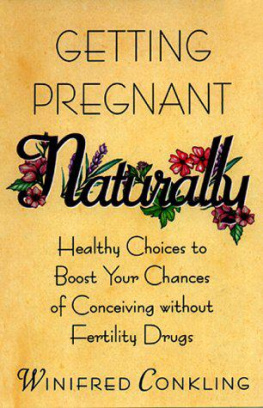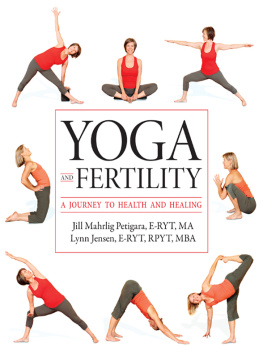FERTILITY
WISDOM
HOW TRADITIONAL
CHINESE MEDICINE
CAN HELP OVERCOME
INFERTILITY
ANGELA C. WU, LAc, OMD
with Katherine Anttila
and Betsy Brown
For my miracle babies, Devin and Robyn
CONTENTS
PREFACE
A WOR D FROM A
WESTERN DOCTOR
I t was 20 years ago when I first became intrigued by the science of fertility. A medical student at the time, I was fascinated by the role hormones play in human health, and with how they affect whether or not a woman conceives.
As my medical career progressed, I made fertility my specialty, and my choice has proven to be both timely and personally relevant. In the 15 years since I began my clinical practicefirst in Seattle, now in San FranciscoIve seen infertility evolve into a high-profile medical issue confronted by more and more couples. According to the Centers for Disease Control and Prevention, in 2002, of the 62 million women of reproductive age in the United States, approximately 10 percent visited a doctor for advice or treatment related to infertility. And if the number of couples visiting my office is any indicationup to 500 new clients a yearthe segment of the population seeking fertility support has only grown since then.
The source of this epidemic, I believe, is largely cultural. It started with the Baby Boomer generation, with couples putting off childbearing by 10 to 15 years while they pursued careers. Today, many young women delay childbearing for various reasons. As their biological clocks tick, the quality of their eggs declines. In my practice, reduced ovarian reserve and unexplained infertility (often a function of egg quality) are the top two infertility diagnoses, followed by sperm disorders in men and endometriosis and Fallopian tube complications in women.
In addition to approaching infertility from a professional perspective, Ive experienced firsthand the emotional and physical challenges couples face when they cant conceive the child they so desire. Without in vitro fertilization, my wife and I would not have our daughter. Our personal struggle with infertility makes me particularly sympathetic to what my clients go through when they come to me for advice and treatment.
Over the years, I have seen more clients take fertility into their own hands by exploring Traditional Chinese Medicine as a complement or alternative to Assisted Reproductive Technology (ART). Many of those women and their partners are also clients of Dr. Angela C. Wu.
At first I was skeptical about Traditional Chinese Medicine, but I took the time to visit with Dr. Wu to understand more about her work. I have to admit, I do not know why Traditional Chinese Medicine has a positive impact on infertility. Im a physician trained in Western theories and protocols, and as you may discover as you read this book, it can be challenging to merge a Western medical mind-set with Eastern ways of perceiving human health.
What I do know is that there are things that Western science simply cant explain. I am open to the idea that spiritthough beyond the realm of Western medicineplays a role in physical health. As Western medicine explores the importance of the mind-body connection in treating illness and keeping people vital, I think we will find that Traditional Chinese Medicine can contribute to our understanding of human health and fertility.
Victor Y. Fujimoto
MD Reproductive Specialist
San Francisco
March 10, 2006
ACKNOWLEDGMENTS
I would like to acknowledge the contributions of a few people without whom this book would not exist.
Rev. Ming-I Tsao, who took me into his home, taught me the complex art and science of pulse reading, and opened my eyes to the big picture of Taoism. I remember the day he read my pulses and told me I was destined to go overseas. At the time I found his prediction only amusing. Since then I have come to realize that, in teaching me to read pulses, he was preparing me for wisdom beyond the corporeal. An appreciator of good food (and an excellent cook), Rev. Tsao knew how to inspire and shape my mind by feeding my body.
Dr. Shun Chiu, a general in the Chinese army, who taught me acu-puncture. Watching him work was a revelation. A group of patients, complaining of headaches, would hold hands. Dr. Chiu would needle only the first person in line, and everyone would feel relief. A dedicated practitioner of meditation, Dr. Chiu was my inspiration in breaking with tradition; he would use only one needle, and leave it in for only a very short time. Today, honoring his wisdom in my clinic, I use fewer needles than many practitioners, and leave them in for less time.
Dr. Yat-Chow Yeung, a well-known scholar in the Chinese community, who taught me the art and science of Chinese herbs. His pioneering wisdom transformed my perspective on healing by providing me with powerful new tools. Breaking with tradition, he honored me as his only female discipleand the last disciple in a long life of teaching. He coached me through the challenges of working with HIV/AIDS patients in the 1980s. And when I would thank him for teaching me about Traditional Chinese Medicine, he would thank me for teaching him about people.
I remember when my beloved mentorthen in his 80s, his health failingbegan to go blind and gave up his healing practice. One day, over a leisurely Chinese meal (our weekend tradition), I shocked him by saying: You know, Im a better doctor than you are...his face fell at the slight... because I have had the privilege of better teachers. You naughty girl! he laughed. And, giving in to my insistence, he honored me again by accepting me as his doctor. Dr. Yeung took herbs according to my protocols and within a week, his vision improved and he felt strong enough to resume his own practice. I could tell he was happy, as I always could, because he patted me on the backan affectionate departure from the strict no touch tradition between men and women in our culture at that time.
Mantak Chia, whose dedicated efforts brought Taoist wisdom and practices to our modern world.
Dr. George Araki, a true pioneer on the frontier where Western biological sciences meet Traditional Chinese Medicine and other alternative approaches to health and wellness. A Stanford-trained scientist who described himself as a holistic biologist, Dr. Araki founded two groundbreaking interdisciplinary programs at San Francisco State Universitythe Center for Interdisciplinary Science and the Institute for Holistic Healing Studies. With his support, leadership, and friendship, I was able to found and direct SFSUs Chinese Healing Studies programthe first of its kindbringing the concepts that underpin my fertility practice to a wider audience of future practitioners. Dr. Arakis amazing spirit and his huge heart live on in the work I do today, both healing and teaching.
Nancy Merrell, who helped me overcome self-doubt and persuaded me that I did have a book in me.
Clare Campbell, who patiently talked me through the concepts that became Fertility Wisdom.
Stuart Kenter, who began the process of translating the fertility program I practice in my clinic into a book reaching out to a much broader audience.
Kathy Anttila, for the great gifts of her time, talents, and support.
Betsy Brown, whose words have given a clear, compelling, beautiful voice to the challenging concepts in this book, and whose steadfast friendship I treasure.
Doug Abrams, who shepherded our writing team through the publishing process and whose own book so inspired me.
Susan Berg, our gracious editor, whose patient and gentle touch has guided us on our journey, and whose sensitive vision for this book enabled us to create something in which we take great pride.

